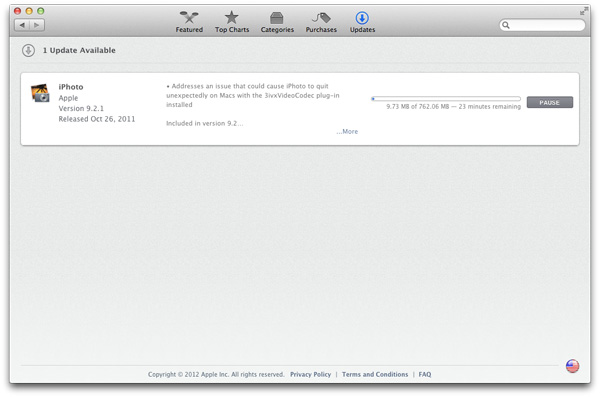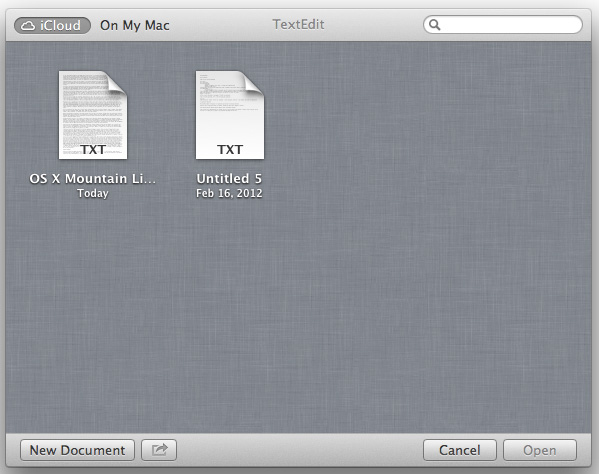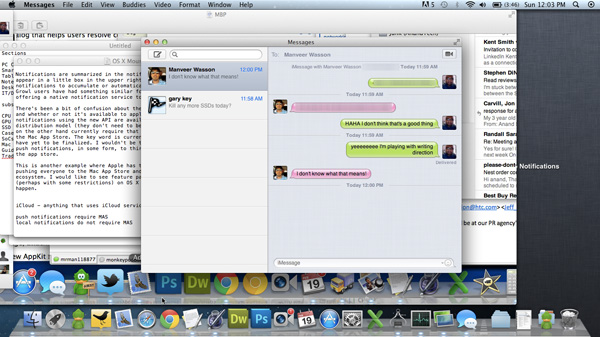Thoughts on the Mac OS X Mountain Lion Developer Preview
by Andrew Cunningham & Anand Lal Shimpi on February 19, 2012 7:40 PM EST- Posted in
- Mountain Lion
- Mac
- macOS
Software Updates & Moving Toward the Mac App Store
To be honest, I rarely use the Mac App Store. I appreciate it because it does let me quickly get Apple applications without fumbling for a restore DVD somewhere, but otherwise I get all of my non-Apple apps directly from the source. The app store makes sense to me on iOS because that's the only option we were presented with from the start, but even there I would appreciate the flexibility of installing apps from any source. On a Mac the opposite is true. Just as was the case on PCs, I've always grabbed and installed software on my Macs from a multitude of sources and I've never really wished there was a centralized, policed repository of Mac applications. That being said, I do understand and accept that I may be a part of a shrinking minority. Apple's most successful products have been those sold effectively as appliances. The MacBook Air took many steps in the same direction by offering no end user upgradeable CPU, memory, storage or battery options. With the MBA you're buying some sort of a Mac appliance hybrid. It's a good device (I'm typing this article on an MBA now), but in many ways it's an inflexible one.
My fear is that as Apple straddles this line between the old and the new, that it will step over too far into the walled garden/appliance territory. That OS X, just like iOS, will become a platform powered only by the app store. That isn't the reality today and I hope that it never will be, but the temptation is surely there. Apple gets a cut of all software sales through the Mac app store, it doesn't elsewhere. App stores are a way of continuing to profit off of a platform after you've sold the initial hardware and operating system. From a customer experience standpoint there's also significant motivation behind supporting only a centralized app store. With complete control of what can run on the platform, Apple could guarantee and maintain the level of experience that it's always been in pursuit of.
Again, today, this isn't a problem but there's definitely movement in that direction. Mountain Lion does away with Lion's Software Update mechanism and instead integrates that into the Mac App Store directly.

There's no change in functionality, just a change in physical location. I will admit that the software update tool always felt like it needed...updating, but I don't know that I would've put it in the MAS application.

Remember all of the new APIs that developers now have access to? A couple of them are only available to applications distributed via the Mac App Store. The big one is iCloud. Any application that interfaces with or uses iCloud is required to be in the MAS. It's the tradeoff you make when you start using Apple's cloud storage as a selling feature of your application. There are ways around this requirement (you could decouple any cloud storage features from your main application and simply offer the former through the app store) but it's a bifurcation of the Mac software feature set for the most part.
The notification story is a little different.
New Notifications API & Interface
Revamping notifications was a major part of the iOS 5 update last year and Apple decided to bring some of that to OS X. Mountain Lion sports a new iPad-like notification center that's accessible by performing a right to left, two finger swipe on a multitouch trackpad. The gesture is unique in that it's the first gesture that must be started at the very edge of the trackpad. A two finger right-left swipe starting in the middle or even an inch from the border of the trackpad is different entirely. To bring up the notifications menu you have to start the gesture at the very edge of the trackpad. It's easier to just start swiping off of the trackpad first, allowing the gesture to then continue onto the trackpad surface. The notification center gesture is very reminiscent of the PlayBook/webOS bezel gestures that have similar requirements for starting outside or at the beginning of the touch area.

Notifications are summarized in the notification center but as they happen they appear in a little box in the upper right of your screen. You can configure notifications to accumulate or automatically disappear after a short period of time. Growl users have had something similar for a while now, but Apple is now officially offering a native notification service to all developers.
There's been a bit of confusion about the new notifications API (NSUserNotification) and whether or not it's available to applications not in the Mac App Store. Local notifications using the new API are available to third party apps regardless of their distribution model (they don't need to be in the Mac App Store). Push notifications on the other hand currently require that the application is distributed only through the Mac App Store. The key word is currently because a lot of Mountain Lion decisions have yet to be finalized. I wouldn't be too surprised if Apple decides to open up push notifications, in some form, to third party applications not distributed through the app store.
This is another example where Apple has to carefully straddle the line between pushing everyone to the Mac App Store and not abandoning the rest of the Mac software ecosystem. I would like to see feature parity regardless of distribution model (perhaps with some restrictions) on OS X going forward, but I'm not sure that will happen.










96 Comments
View All Comments
Jaybus - Tuesday, February 21, 2012 - link
Well, I think that if they go that route, then they will find themselves in court, just as Microsoft did. Embedding APIs available only to App Store apps is almost identical to Microsoft embedding Internet Explorer primitives into Windows. It is an unfair trade practice, and the DOJ will be all over it seeking a hefty fine to line the DOJ lawyers pockets.InsaneScientist - Sunday, February 19, 2012 - link
Awesome preview as always, guys!A little niggle that has been bugging me for some time, I've just never gotten around to mentioning it: When you have an article with multiple authors that includes personal opinion (ie. things that are written first person) could you provide some indication of who wrote which sections? I'm pretty sure I've seen it from time to time in the past, but it's not consistent.
I'm just OCD enough that I'm always wondering which person's opinion I'm reading at a particular point in time.
With that out of the way, a random question: Does 10.8 support the ability to pause and resume file copies? I've actually found that I use that feature in the Windows 8 developer preview a LOT more than I would have thought.
I also find it interesting that they seem to be simultaneously trying to make OS X server more consumer friendly (such as the management options for iOS devices) whilst making it so that it can't be the only server on a network by (potentially?) removing DHCP. Any insights into the contradiction?
Malih - Sunday, February 19, 2012 - link
exactly, I think many readers wonder who is "I" on one particular section of the article.Kristian Vättö - Monday, February 20, 2012 - link
Unfortunately, you cannot pause a file transfer in the current developer preview :-(Mr. S - Sunday, February 19, 2012 - link
"... Mountain Lion is dropping support for any Mac that is not capable of booting OS X's 32-bit kernel."I think you mean 64-bit.
Andrew.a.cunningham - Sunday, February 19, 2012 - link
Yup! Fixed.MonkeyPaw - Sunday, February 19, 2012 - link
My concern with aggressive OS releases is that of support. While I think iOS does a better job than Android when it comes to mobile unity, Apple has been notorious for dropping "old" desktop models from its support list. These aren't cheap pieces of hardware, nor are they useless as everyday machines on the day Apple drops them. While you can continue to run old versions of OS X on these machines, will security and stability updates continue? Will Apple will find that people are using anywhere from 10.6 to 10.10 in 3 years? Seems like it will get fragmented, which, as MS can tell you, is a nightmare. Sure Apple can just end support of "old" versions of OS X, but that has its risks. Will software developers keep up? What if people choose to stay on a given version because they don't want to upgrade?Don't get me wrong. I want to like Apple's products. I've owned Macs before back in the PPC days, and I have an iPhone 4 (work-issue). The hardware is top notch, and I like OS X for the most part. It's Apple's business practices that I just can't get on board with. I just wonder how many more people there are that feel this way that elude Apple's sales. Apple reap billions already, so maybe they are just fine with not having people like me as customers.
HunterKlynn - Monday, February 20, 2012 - link
Well, for dropping old hardware I kind of understand it, and if anything I think they're trying to reduce fragmentation. Right now, they're basically saying "it's time for 32 bit to just go away forever" which is a mindset I can easily get behind. That and requiring everyone to have OpenCL support which also is a matter of bringing the platform in line.I would assume an annual release cycle would have a reduced list of dropped hardware since A) things won't have changed quite so much and B) the two major changes in hardware types have been covered by the requirements on Mountain Lion.
name99 - Tuesday, February 21, 2012 - link
What exactly is your complaint? That's the part I don't understand.Apple has a very clear policy on security updates; and even when they stop providing them, chances are that your system is secure enough that it's not big deal.
So you are upset that you bought a computer and Apple will stop providing new software for it seven years later?
If you still want to use your slow computer seven years after Apple stopped supporting it, go ahead and do so --- it will still work. I have a PPC laptop I use as server running 10.5, and a 1st gen Intel laptop running 10.6. I don't bitch and whine about how they can't run newer OSs because what's the big freaking deal? They still work every bit as well as they did last year and the year before that. You come across as a guy who buys a car then complains that he has to buy gas every so often.
Maintaining backward compatibility forever is not free --- just ask MS. Forcing backward compatibility introduces bugs and makes it that much more difficult to add new features or improved algorithms. To take an obvious example --- if (when?) Apple introduce a new file system, it's a whole lot easier if they can just assume that it runs only on 64-bit machines and that they can cleanly use 64-bit integers and even 64-bit assembly where-ever they need to. (And don't tell me that compilers can support 64-bit longs transparently on a 32-bit machine --- yes they can, but not atomic operations on 64-bit longs.)
And it's not like Apple have made these decisions randomly. Dropping PPC, then dropping Intel 32-bit support are both obvious decisions that allow the company to concentrate on moving forward rather than constantly being slowed down by the past.
The good news is that, for the most part, it's over now. The obvious future transitions are
- drop ALL 32-bit code support (maybe coming in Mountain Lion even)
- drop Carbon
at which point ideally Apple has the energy to move forward with one OS and one runtime a whole lot faster.
On the other hand, we are going to see, soon enough, the transition to 64-bit iOS. Expect a whole lot of bitching at that point from people who are upset that Apple won't support their iPad2 for the rest of time.
B3an - Sunday, February 19, 2012 - link
It's very obvious that this faster release cycle is in response to Windows 8. All the massive changes and improvements in W8 obviously have Apple worried. Especially with all the upcoming W8 tablets that will cut in to iPad sales. And unlike Mountain Lion which wont run on older Apple hardware, W8 will run on most PC's that can run the decade old XP, because as a benefit of all the performance optimisations for tablets i've managed to get Win 8 to run atleast as good as XP on laptops that are over 7 years old and only have 512MB RAM.And correct me if i'm wrong, but i dont remember seeing any article like this mentioning the new stuff within the Windows 8 Dev Preview when it came out late last year. Win 8 is a FAR bigger change and update than Mountain Lion, yet there was nothing like this article. I know the Dev Preview was missing many features but still disappointing.